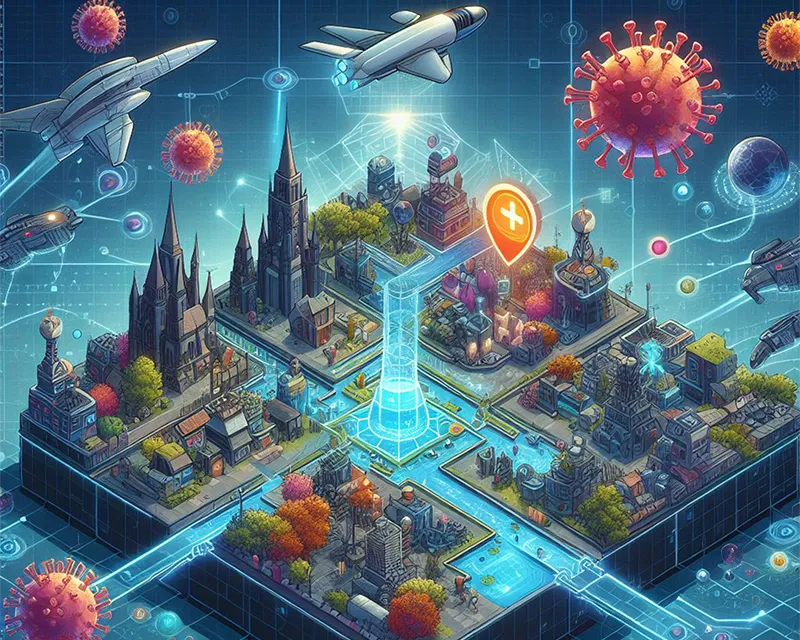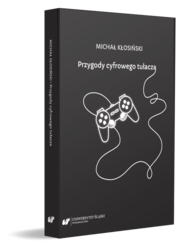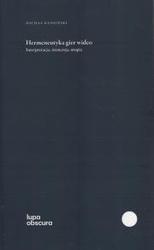Science
Projects carried out by members of the Game Studies Research Centre

Michał Kłosiński
Mapping Game Biopolitics: Immunological Paradigms in Digital Games, the National Science Centre

The purpose of this research project is to pose questions about the different ways of representing life and death management in games (biopolitics). How do games—understood as texts of culture—convey our fantasies, ideas or fears about various modern regimes? What solutions to social, economic and political problems are presented to us in relationship with state institutions, mechanisms of power or population control? Our goal is to describe how the issues of control over life and death are problematised in many game genres. We’re interested in describing how games invite players to reflect on the positive and negative ways of social control.
Research description:
It can be said that the research in this project is conducted in virtual reality, because most of it comes down to playing games and searching their worlds for different representations and problematisation of biopolitics. The research focuses on developing a typology and creating a map of individual elements of digital worlds, game mechanics or ideological representations of different ways of controlling life. This means that we are looking for a certain generalised schema that would be useful when comparing narratives problematising the functioning of various positive and negative social visions.
Reason for the research:
We want to better understand how people construct narratives about managing life, what patterns appear in these narratives, and how video games represent and shape our concept of power, protection or extermination of other beings, groups or civilizations. By studying games, we want to find out more about our views on politics, economy and society, also in times of biopolitical restrictions related to the pandemic. What fears, behaviours and ways of thinking are constructed in games and presented to players as models for understanding phenomena such as the state of exception, migration, annihilation. What biopolitical opportunities do games offer us, players?
Results of the research:
The main output of our research will be an insight into the cultural importance of games as carriers of various biopolitical solutions. Our typology will deepen your knowledge of games as an important medium, which creates ideological models for understanding and rethinking both real as well as fictional systems of exercising power over life and death. Mapping immunological paradigms in games tells us what games offer in our understanding of biopolitics.
Magdalena Bednorz
ORCID: 0000-0003-1354-750X
ResearchGate: www.researchgate.net/profile/Magdalena_Bednorz
List of publications: publications (us.edu.pl)
Emotional effort as the basic principle of (courtly) love. Romance with Anomen in ‘Baldur's Gate II’
Images. The International Journal of European Film, Performing Arts and Audiovisual Communication, No. 33(42), 2023, pp. 307–325.
Heroine’s Journey to Love: Spatial Rhetoric in Romantic Subplots in BioWare’s Fantasy RPGs
Images. The International Journal of European Film, Performing Arts and Audiovisual Communication, No. 29(38), 2021, pp. 191–204.
Playing Out the Unspeakable: the Rhetorics of Trauma in 'The Day the Laughter Stopped' Digital Game
Res Rhetorica, No.29(38), 2021, pp. 83–97.
Digital Experience of Love and Loss: Emotional Game Design in Emily is Away
Przegląd Kulturoznawczy, No. 1(43), 2020, pp. 108–121.
Gamer Identity Crisis – Meaning of the Term ‘Gamer’ in View of the Popularisation of Video Games
Homo Ludens, No. 2(8), 2015, pp. 10–21.
Tomasz Gnat
ORCID: 0000-0002-9740-8314
ResearchGate:
List of publications: opus.us.edu.pl, publications (us.edu.pl)
Agnieszka Kliś-Brodowska
ORCID: 0000-0003-1024-1601
ResearchGate: researchgate.net/profile/Agnieszka-Klis-Brodowska
List of publications: publications (us.edu.pl)
gry
A Fairy-Tale Digital Game and the Potential for Revision: Ubisoft Montreal’s Child of Light
Agnieszka Kliś-Brodowska. Marvels and Tales. Vol. 37, No. 1 (2023), 21-47. DOI: 10.1353/mat.2023.a900259
Writing a Discipline: The History of Digital Games Research and the Meanders of Writing It on the Example of Frans Mäyrä’s ‘A (Very) Short History of Game Studies’
Agnieszka Kliś-Brodowska. Homo Ludens. No. 9 (2016), pp. 13-30 (article of the year). Available on the publisher’s website
gotyk
Ghosting History/Historicizing the Ghost: Time Passage in T. C. Haliburton’s ‘The Old Judge’
Agnieszka Kliś-Brodowska. Journal of Commonwealth Literature. Vol. 58, No. 1 (2023), pp. 213-228. DOI: 10.1177/0021989420969768.
’Going Back to the Middle Ages’: Tracing Medievalism in Julia Beckwith Hart’s ‘St. Ursula’s Convent’ and John Richardson’s ‘Wacousta’
Agnieszka Kliś-Brodowska. In: Medievalism in English Canadian literature: From Richardson to Atwood, MJ Toswell, Anna Czarnowus, ed. D.S. Brewer. Cambridge 2020. ISBN 978-1-84384-547-8, pp. 36-51. DOI: 10.1017/9781787448858.003.
From the Outside to the Inside and the Other Way Round: The Space of Contemporary Gothic Cities
Agnieszka Kliś. In: Exploring space: spatial notions in cultural, literary and language studies. Vol. 1, Space in cultural and literary studies, Andrzej Ciuk, Katarzyna Mołek-Kozakowska, ed. Cambridge Scholars Publishing. Newcastle upon Tyne 2010, pp. 378-386.
Michał Kłosiński
ORCID: 0000-0002-5169-5338
ResearchGate: www.researchgate.net/profile/Michal-Klosinski
List of publications: publications (us.edu.pl)
Adventures of a Digital Nomad. Game Interpretation
Hermeneutics of Video Games. Interpretation, Immersion, Utopia
Broken World. On ‘World. Naive Poem’ by Czesław Milosz
(Warszawa 2013)
The Only Hope Is Poetry. Baudrillard – Theory – Literature
(Warszawa 2015)
More After More. Essays Commemorating the Five-Hundredth Anniversary of Thomas More’s Utopia
with Ksenia Olkusz and Krzysztof M. Maj (Kraków 2016
The Discourses of Video Games
with Krzysztof M. Maj (2019)
Bartosz Stopel
ORCID: 0000-0002-2100-2182
ResearchGate:
List of publications: opus.us.edu.pl, publications (us.edu.pl)







